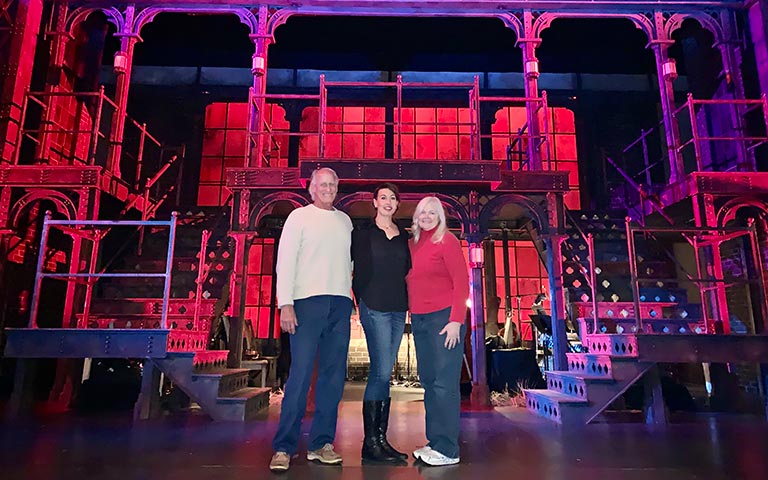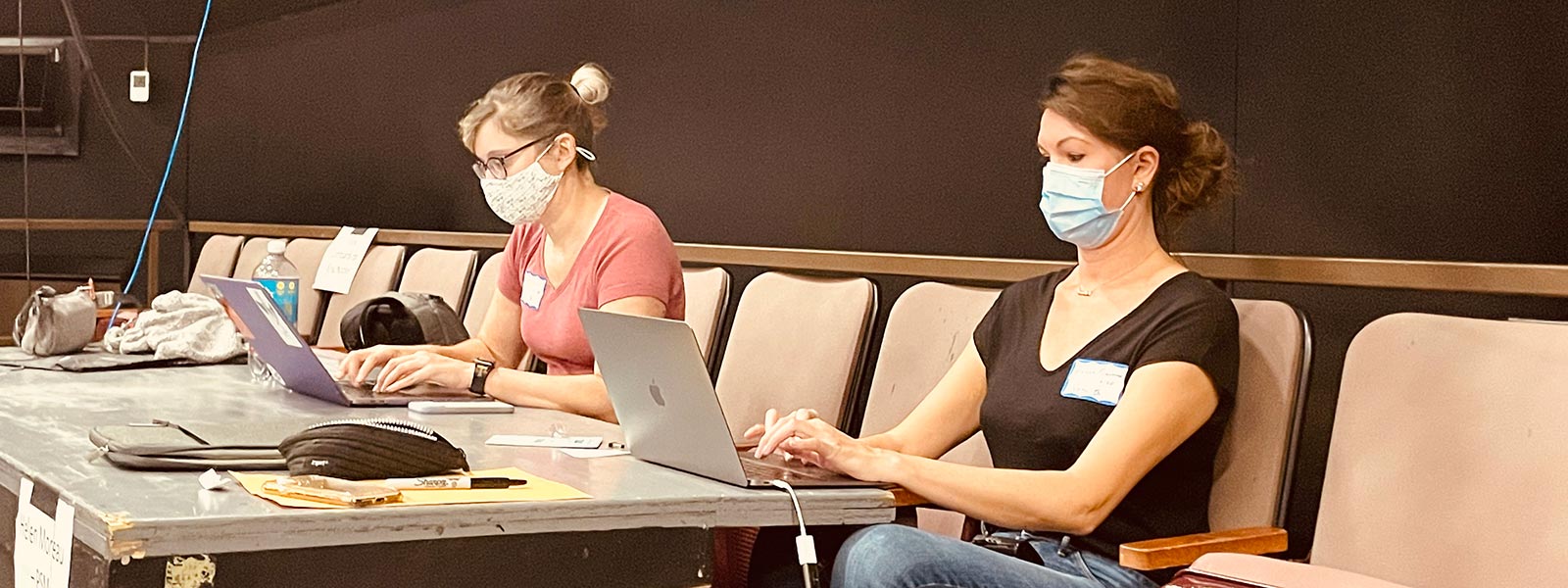Production and Project Management grad Sarah Penland sets her sights on Broadway
When Sarah Penland made the decision to attend graduate school for production and project management (PPM), she had some specific criteria in mind. She knew she wanted to expand her skills and knowledge as much as possible. She also wanted to make sure she chose a program that would open doors and set her on her desired path — becoming a production manager on Broadway.
The PPM program in the School of Design and Production checked all of those boxes for her, and has helped to bring her closer to her goal. Following her graduation from UNCSA, she will head to Broadway in August as an assistant production manager.
Despite the scaled-back nature of the industry during some of her time in graduate school, Penland was able to gain quite a bit of experience, including as a production manager at the Chautauqua Theater Company, as a Sherry Wagner-Henry Board Fellow with the U.S. Institute for Theatre Technology (USITT) Board of Directors and in an internship as an associate production manager at New York City's Cathedral Church of St. John the Divine.
As she prepares for the commencement stage, Penland reflects on her time in the PPM program, the skills she's gained along the way and the experiences that have helped propel her into the next phase of her career.
Can you tell us about why you decided to attend UNCSA for graduate school?
I went to undergrad in New York and worked for a cruise line for almost a decade. I made the decision to transition away from that, and I really wanted the most number of doors to be open to me that could possibly be open. I knew that an M.F.A. program was the way to go.
When I made that transition, I applied to five schools for production management: UNCSA, Florida State, Carnegie Mellon, Yale and Boston University. I wasn't sure at the time where I was going to end up.
It was winter of 2019, every interview was in person and UNCSA was the last school that I visited. I really liked Eric Nottke (director of the PPM program), and the students in the program seemed happy. Eric and I had a few conversations ahead of time and I connected with him and the career he's had. And I loved that the program focuses on production — not just in the sense of theater, dance and opera — but there's also the project management component that makes it an incredibly versatile degree.
If you could say thank you to one person at UNCSA, who would it be? Why?
Eric Nottke — I see him as my greatest cheerleader. In summer 2020, I thought I was going to be a production manager at Williamstown Theatre Festival, where he had also worked, and that was going to be a huge professional step for me. It ended up not happening because of the pandemic.
I remember seeing the official announcement in the New York Times that the festival was canceled. I was at my parents' house and I called Eric, and he really spoke to where I was and the fears that I had. He's a huge champion of me and everyone in the program and I feel taken care of by him.

Penland on the set of "Spring Awakening" with her parents.
Can you tell us about your internship in production management at The Cathedral Church of St. John the Divine?
I didn't know until I was offered this internship that it is the largest cathedral in the world. It's a Gothic cathedral on the Upper West Side of New York City, and it hosts liturgical events, Sunday service, concerts, lectures, and is also a venue for outside events like galas and fundraisers. It is also one of the homes of the New York Philharmonic right now.
When I first started working at the cathedral in the fall of 2021, nothing was happening in person — so one of the biggest pieces of the position has been livestreaming. That comes with a certain level of production, needing things to look and sound a certain way in video format.
I heard about the internship through the UNCSA Design & Production Job Fair in February 2021. I was connected with a person named Brendan Boyd who eventually took over as Director of Production at the cathedral, and he gave me a call in the fall to ask if I was interested.
And your fellowship with the USITT Board of Directors?
The fellowship provides a non-voting seat on the board of USITT, so everything that the board of directors does, I'm a part of. A big thing that production management deals with is money and budgeting. When I worked for the Chautauqua Theater Company, which is part of a larger institution, I was always hearing about the board when it came to making financial decisions … I knew theoretically how a board worked, but I'd never been in a board meeting.
So, I applied for this with the hopes that I would get hands-on experience of what that looked like. And part of the fellowship is that they want young people and more diverse voices. It's cool because even though I don't vote, my perspective is looked to as a voice on many different things.
What skills or tools do you feel you're taking with you from the PPM program?
My experience has been that there's a flexibility with the school and the program to support the students with where they are, and where they want to go.
My experience has been that there's a flexibility with the school and the program to support the students with where they are, and where they want to go.
Sarah Penland
I learned how to deal with money and finances and accounting in a really big way. Previously, I had worked as a stage manager, and that's what my undergraduate degree was in. With production management, I had no idea what the entire timeline of a production looked like, working with designers and shops and getting something into the theater with a lot of different pieces coming together.
My first semester we looked at timelines and deliverables and how to get the work done by having great communication with people. Eric Nottke will tell you, 'Communication is our tool and our skill, and that is what we are selling.' It's what you have to be good at when you go out into the job market.
There's an idea that you have to be excellent at all of these different software programs or all of these very, very technical things. I think the theory and mentality at UNCSA is that, yes you need to know those things, but it's ultimately about being able to communicate in and around those pieces.
by Corrine Luthy
Get the best news, performance and alumni stories from UNCSA.
SUBSCRIBE TO OUR NEWSLETTERS
April 30, 2022






